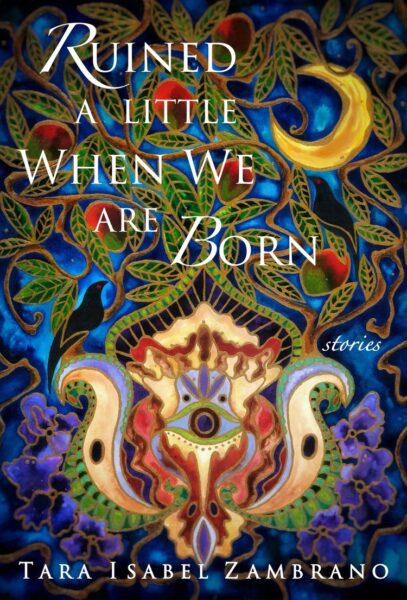
Reviewed by Emily Webber
In “Mother, False,” the opening story of Tara Isabel Zambrano’s spectacular new story collection, Ruined a Little When We Are Born, a girl’s body transforms after her mother’s death. Now, she must be the caretaker for her siblings, watch over her father’s grief, and process her mother’s memory. Extra hands and her mother’s words spill forth from the girl’s body. Her mother’s ghost lingers:
The girl massages her mother’s scalp—there are dead insects, dried leaves, dirt—as if it’s a little ritual to make her feel at home. Her extra hands swat the flies. Steam from a pot of boiling rice curls in their hair like cobwebs. She offers a bowl of stir-fried veggies, boiled eggs. Her mother’s mouth opens like a dark, wide hole where all her children can fit. She swallows the food without chewing. “In afterlife, there’s no metabolism, only hunger,” she says. From the drawn curtains, the sun pokes their eyes. The girl touches her mother’s bluecooled skin, love handles around her waist, the rice-bowl cavity of her chest and senses a pulse—not enough to be a heartbeat, only a memory of a life that once was.
It is a beautiful and heartbreaking portrayal of motherhood, a young girl learning what her mother’s life was like and the oddness of memory and loss. Every story in this collection touches on family, marriage, motherhood, and other relationships, with stories that bend reality to ones firmly rooted in the realistic, showing characters transformed by life.
Those who have encountered Zambrano’s work from her first collection, Death, Desire, and Other Destinations, will find familiar stories of the Indian diaspora and her electric writing on desire in all its forms. In both her collections, desire is a strong pulse running through stories that are often tragic or steeped in sadness—what these characters desire doesn’t usually translate into what brings them happiness. Zambrano’s writing on desire is powerful because it is never just a moment between two people; the desire explodes through their whole environment.
The next time my husband kisses me, his tongue’s edge is a soft divider sweeping my cheeks. He clicks it in his sleep. Then he gets up and wanders in the yard. At dawn, he taps our bedroom window, puts his palm on the glass, baby scales twitching on his skin. He says he wants to slither inside my body as if it were a dark, wet hole. He licks the window and hisses, a wet curve on the glass. The birds at the feeder shriek, they swirl over his head before flying away. I call him inside and his boots ring out sharply on the tiles.
She is also a writer who does not ignore the physical bodies of her characters, and this makes her writing, especially on desire, so effective and her characters more alive in the reader’s mind.
“I wish you had a personal phone,” he said. “Then I’d call and whisper love songs into your ear.” Akbar with this tattoo of a flame on his upper right arm, mostly covered under his white kurta. Akbar with a tang of mutton masala on his finger pads, Akbar with slim curved ribs that bent like a spring as he kissed my neck. After he let go, I collapsed, the smoke escaping of my mouth one wing at a time—a bird.
Many stories also examine the impact of long-held beliefs and cultural expectations that take a strangling hold on these characters. In “Saanwalee,” a girl’s mother makes her try different things to lighten her skin so she can better her marriage prospects. A young woman leaves her beloved brother in “It Rained That Day” to marry a much older man in an arranged marriage. Two young lovers in “Cow’s Tongue” face the inevitability of their relationship because they are from different religions. In one of the most powerful stories in the collection, “Shabnam Salamat,” a girl’s father takes a much younger second wife to try to have a son. This act by her father changes his daughter’s life in horrifying and unexpected ways. Reading these stories, one can see the many different paths these lives could have taken had they been freer.
I wonder if somewhere west the sun is still golden over a boy and girl like Sharad and me, awkwardly kissing for the first time in the back seat of his parents’ car. I’ll never know those people, I think.
Some of these characters are stunned to find that the things they desire, like marriage and children, don’t pan out to be as fulfilling as they expected. Multiple stories mention the fear of outliving love and facing the fact that what we desire most can change. “Fever” is a story where it seems, for a moment, that happiness is attained with marriage and the birth of a child. But the woman moves further away from the version of herself she has always known: The clock empties hours into the walls. Shadows lengthen and shorten, but I feel less and less like me.
At the end of the story “White Ash,” a couple sits in the parking lot of the police station. When they get out of the car, they will learn the fate of their missing four-year-old daughter. What the mother says when she’s referring to the snow falling, but really about life, sums up the mundane and horrifying struggles of life eloquently captured in this collection:
“It’s like flowers falling from the sky until they hit the ground and become dirt. Some slow, some too fast. That’s the journey, isn’t it? From above to down here.”
Ruined a Little When We Are Born will be out on October 15, 2024 from Dzanc Books. Pre-order now. If you are in SmokeLong Fitness, we will be reading an advance digital copy of this collection in our June reading group. Details soon!
_____________________________
 Emily Webber was born and raised in South Florida where she lives with her husband and son. She has published fiction, essays, and reviews in the Ploughshares Blog, The Writer magazine, Five Points, Maudlin House, Split Lip Magazine, and elsewhere. She’s the author of a chapbook of flash fiction, Macerated, from Paper Nautilus Press. Read more at www.emilyannwebber.com.
Emily Webber was born and raised in South Florida where she lives with her husband and son. She has published fiction, essays, and reviews in the Ploughshares Blog, The Writer magazine, Five Points, Maudlin House, Split Lip Magazine, and elsewhere. She’s the author of a chapbook of flash fiction, Macerated, from Paper Nautilus Press. Read more at www.emilyannwebber.com.

 A SmokeLong Summer 24!
A SmokeLong Summer 24!